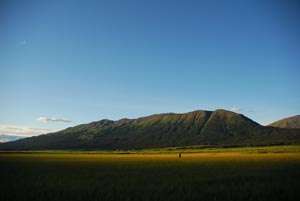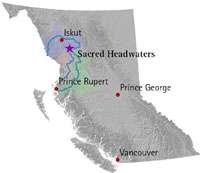Sacred Headwaters
The Sacred Headwaters is a subalpine basin in northern British Columbia, Canada, that is the source of three wild salmon rivers: the Skeena River, Nass River and Stikine River. It is also referred to as the Klappan Valley, although the Klappan—a tributary of the Stikine River—is only one of the area's watersheds. Local Tahltan people call the area Klabona, which is loosely translated as "headwaters."


The area has a significant population of grizzly bears, stone sheep, caribou, wolves, and goats.[1] Salmon swim over 400 kilometres from the Pacific Ocean to spawn in the upper reaches of the river.
Industrial development
The Sacred Headwaters is rich in mineral and energy resources, particularly coal and coalbed methane. Several industrial development projects are planned for the area, including Fortune Minerals' open-pit Klappan Coal Mine[2] and Royal Dutch Shell's Klappan Coalbed Methane Project.[3] Shell Canada's website reports to be conducting several environmental baseline studies being carried out within the Klappan tenure area.[4] The British Columbia Ministry of Energy, Mines and Petroleum Resources estimates the Klappan coal deposit could contain as much as 8.1 trillion cubic feet (230 km3) of coalbed methane gas.[5]
Klappan Coal Mine
Fortune Coal Limited (FCL) entered on 13 July 2011 into an unincorporated joint venture with Posco Canada (POSCAN). The venture, an 80–20 split, is based on mineral rights held by FCL and finances provided by POSCAN. FCL is 100% controlled by Fortune Minerals Limited, an Ontario-based company that trades on the TSX Venture Exchange, as symbol "FT". POSCAN, which has so far contributed $30 million to the project, is a subsidiary of one of the world's largest steel producers,[6] and has strong ties to the Government of South Korea.[7] The existing financial resources of the FML were not sufficient to bring any of its properties into commercial production as of 2012. The Klappan project was estimated to need $789 million to begin production, and to generate substantially less than 1,000 jobs.[8] FML calls this the "Arctos Anthracite Project", and has dedicated a web page with detailed maps to its story.[6]
The government of British Columbia, in whose jurisdiction the mineral rights are held, planned on 20 September 2013 to dispatch a minister to deal with the First Nations' blockade of the project.[9] The First Nations have vowed to defend the Sacred Headwaters. "We dare Fortune to get us arrested," said group spokesperson Rhoda Quock. “We have cameras here. We will make sure the world knows what’s going on.”[10] On 23 September 2013 Quock was interviewed[11] on CBC's As It Happens, and asked Fortune to obtain an injunction. The Royal Canadian Mounted Police is on location. The CEO of FML explained on 24 September 2013 in a radio interview that the company would not seek an injunction, and that they would let the BC government mediate a settlement instead.[12]
Klappan Coalbed Methane Project
The Klappan Coalbed Methane Project is a proposal by Shell Canada to develop a coalbed methane project in the Sacred Headwaters. In 2004, the British Columbia government granted Royal Dutch Shell (which is now a parent company of Shell Canada) a 400,000 hectares (4,000 km2) tenure for coalbed methane development. It is accessed by road via the abandoned BC Rail grade, which intersects British Columbia Highway 37 south of Iskut. As of summer 2008, Shell's project was in the exploration phase. Shell drilled three exploratory wells in 2004 and was preparing to drill an additional 14 wells in 2008, 8 of which were proposed for the headwaters of the Skeena River. If developed, Shell's project will entail a network of gas wells connected by roads and pipelines, as well as a pipeline to deliver the gas to market. Shell has disclosed neither how many wells will be necessary to make the project economically viable nor route options for the delivery pipeline. The Klappan Coalbed Methane Project has been met with opposition by both First Nations groups and non-governmental organizations. The Pembina Institute, an environmentalist think-tank, released a report on the potential impacts of the Klappan Coalbed Methane Project on wild salmon, calling it a "risky experiment" as commercial coalbed methane production has never been attempted in a salmon-bearing watershed.[13] On December 18, 2012, the B.C. government announced that Shell Canada would relinquish its tenure on the land, and that oil and gas development would be banned in the Sacred Headwaters.
References
- "Fort St. James Land and Resource Management Plan". 1999. Retrieved 2009-03-27.
- "Klappan Coal mine".
- "Klappan Coalbed Methane project".
- "Shell Canada – Protect the Klappan Environment".
- A Summary of Coalbed Methane Potential in British Columbia, Barry Ryan, BC Ministry of Energy and Mines, British Columbia (no date).
- "Arctos Anthracite Project" web page.
- " Company Overview of POSCO Canada Ltd." on Business Week
- Fortune Minerals 2012 Annual Information Form
- CBC.ca: "B.C. minister to visit First Nation blockade"
- Business in Vancouver 20 Sep 2013: "Tahltan Elders ramp up Sacred Headwaters mine protest after mediator appointment"
- CBC interview, "As It Happens" 23 Sept 2013
- "As it Happens" edition 24 September 2013
- "Coalbed Methane & Salmon" (PDF). Pembina Institute. Retrieved 2009-03-27.
Bibliography
- Wade Davis, "Don't sacrifice the Sacred Headwaters.," The Globe and Mail, October 8, 2007.
- Andrew Findlay, "A methane battle is brewing," The Georgia Straight, August 23, 2007.
- Monte Paulsen, "A gentle revolution," The Walrus, December/January 2006.
- Bassett, Monty, "Dewatering the holy headwaters," Northword Magazine, Spring 2005.